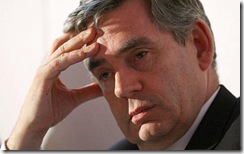When Gordon Brown called on the British Library to stage an exhibition about Britishness he perhaps envisaged a patriotic celebration of the national identity.
By Chris Hastings, Arts and Media Editor, Beth Jones and Stephanie Plentl
17 Aug 2008
A spokesman for the British Library said: Downing Street initially suggested a display of iconic British ideas. We took our lead from that idea but the team has developed it Photo: PA
What he would not have expected is the resulting event, Taking Liberties, which encourages visitors to contemplate the perilous state of civil liberties in modern Britain under his Government.
The exhibition, which is the most ambitious in the British Library's history, is in direct response to a call from Mr Brown for the institution to hold a display of patriotism, and critics have described it as a "snub" to the Prime Minister.
Visitors will be asked their views on issues such as ID cards and detention of suspects for up to 42 days, both of which are key Government policies.
Exhibits will be displayed in space in the shape of a clenched fist. As visitors progress through the exhibition, the space gets smaller and smaller to give the impression of confinement. Each visitor to the exhibition will be given a personal ID number.
David Davis, the former shadow Home Secretary who recently stepped down from the Parliament to force a by election on the issue of civil liberties, said: "It is an astonishingly good idea but is clearly a snub to the Prime Minister and must be accurately embarrassing for him. Gordon Brown likes to talk about Britishness a lot without understanding that liberty is at the core of Britishness. It is our institutional DNA. Our history and tradition of freedom run longer and deeper than any other country."
A spokesman for the British Library said: "Downing Street was very keen for the Library and some other institutions to come up with an exhibition which celebrated Britishness.
"In the end it was agreed that the Library should take up the mantle. Downing Street initially suggested a display of iconic British ideas. We took our lead from that idea but the team has developed it with considerable consultation over time.
"The Taking Liberties exhibition is very much our own idea. Obviously we listened to the Prime Minister's initial thoughts but we decided in what direction we should go. Of course its a risque subject but the Library wanted to come up with something that was relevant to modern Britain."
The exhibition, which has been organised with the help of groups such as Liberty, the Citizenship Foundation and the UK Youth Parliament, will feature more than 170 items which have some connections with former and current struggles for individual and civil liberties.
Iconic objects such as the Magna Carta, the death certificate of Charles I and Cromwell's Oath of Loyalty from 1857 will be on display among less well known items some of which have never been on display before.
They include prison diaries kept by suffragettes, sketchbooks from the English Civil War, as well as petitions from various radical movements including the Chartists. But the exhibition is more than a celebration of the nation's past, with the focus on current topics like ID cards, 42 days detention and internment without trial.
The exhibition has been specially designed so that it can be altered to reflect breaking news stories which have a civil liberties theme.
The display items will be displayed in chronological order but visitors will also be encouraged to view them in connection with certain themes. These include the right to justice, freedom of speech, freedom of expression and freedom from want. As they make their way through the displays, visitors will be asked to consider the similarities between modern day protest groups and their counterparts from the past.
For instance, they will be lead to compare the motives and tactics of Fathers from Justice with those of the Suffragette movement.
Shami Chakrabati the director of Liberty said: "Liberty has been delighted to work with the British Library on its exciting new "Taking Liberties" project. The oldest unbroken democracy has become rather complacent about hard-won rights and freedoms. This important exhibition will remind us how much we have to lose."
The exhibition, which opens on October 31, will also make extensive use of film footage from the past and present.
Visitors will be able to watch newsreel footage of David Davies talking about the 42 day detention issue. They will also watch a film report about Belmarsh prison so they can consider the debate surrounding the imprisonment of terrorist suspects without trial.
More vintage film offerings include the 1913 film of Emily Davison, the suffragette, throwing herself under the King's horse and an interview with some first-time women voters. There will also be news items about internment during the Northern Ireland Troubles.
The Library has also arranged a programme of talks to coincide with the exhibition. Guest speakers include Germaine Greer, Peter Tatchell, Ken Livingstone, Sir Trevor Phillips, Baroness Shirley Williams and Michael Wills the Justice Minister.
The opening night will feature a display by Gerald Scrafe, the cartoonist and a performance by the band the Levellers.

No comments:
Post a Comment